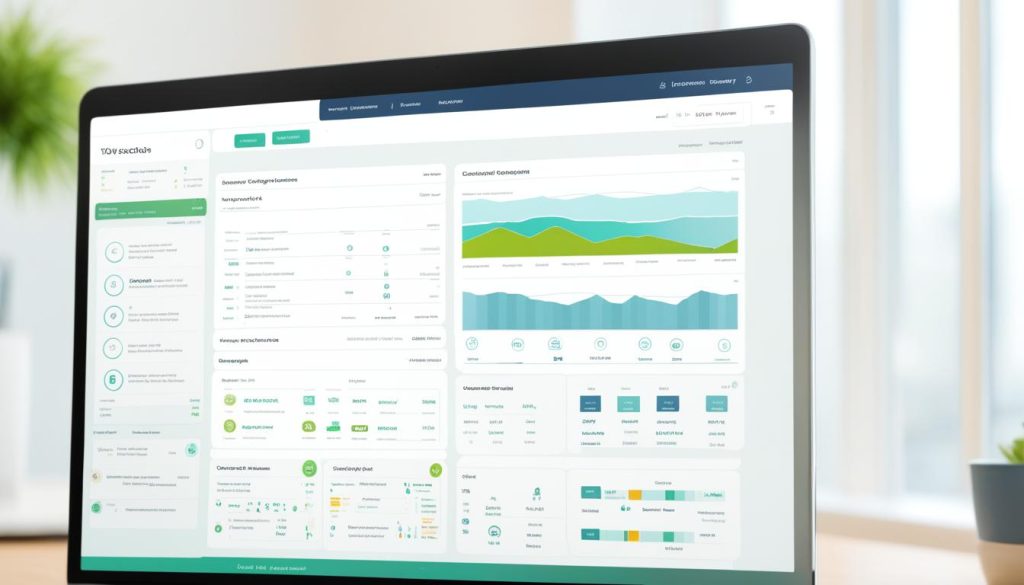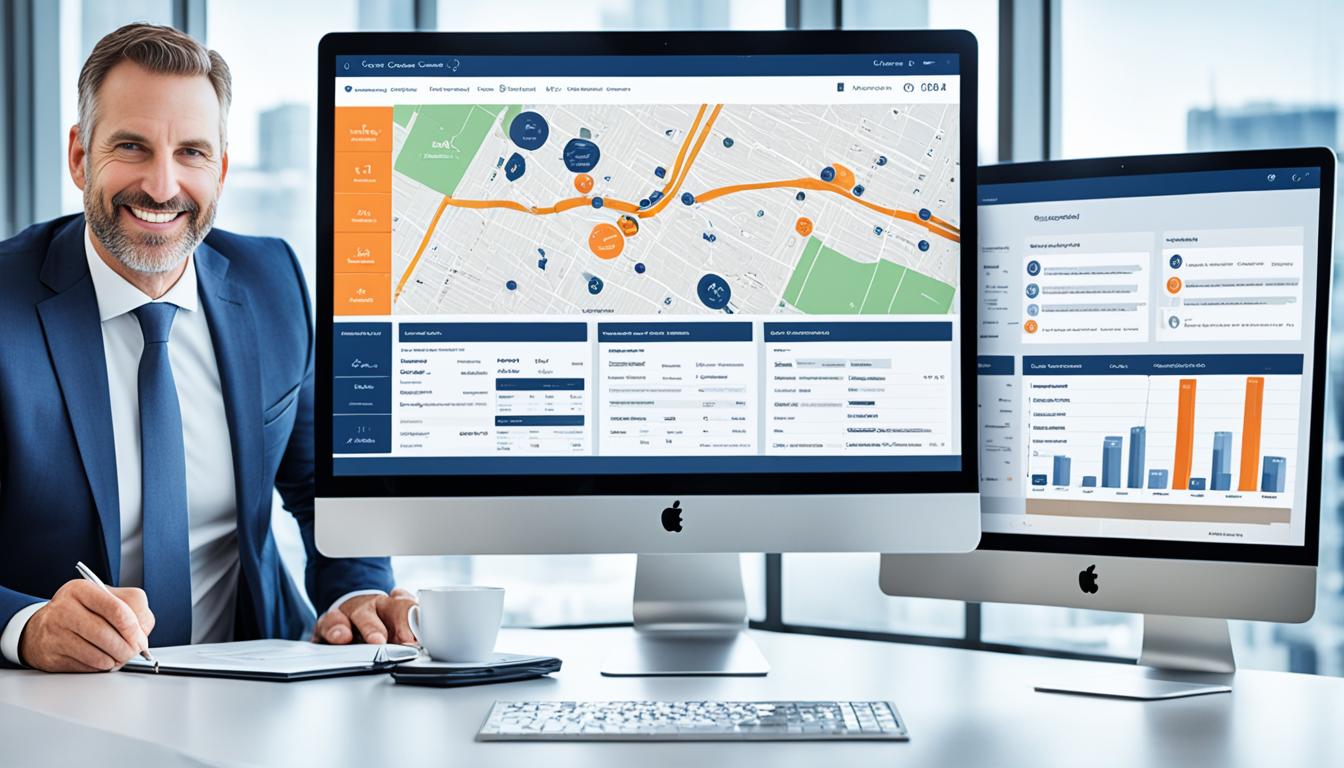Commercial real estate is always changing, pushing brokers forward. The best CRM for commercial real estate brokers is key to staying ahead. It’s designed to connect deeply with the industry’s core, focusing on boosting efficiency and helping brokers grow. These tools are more than just digital lists; they’re trusted partners in a fast-moving marketplace.
Real estate CRMs are built to meet the unique needs of today’s professionals. They excel at tracking client interactions and smoothing out deal talks. With commercial real estate CRM, tasks are automated. This frees up time for the important stuff, like planning strategies and growing your business.
Being mobile-friendly acknowledges the active role of a broker’s life. This ensures work is seamless, whether you’re at your desk or out in the field. It’s about creating a strong, easy-to-use tool that supports brokers on their journey to success. Here, pairing efficiency with growth makes the perfect CRM more than just useful; it’s a must-have.
Key Takeaways
- A superior CRM tool intricately aligns with commercial real estate broker needs.
- Operational efficiency is heightened through automation and streamlined client management.
- Modern CRMs champion growth by providing expansive networking and analytical tools.
- Seamless technology integration is crucial for a CRM’s adaptiveness to broker workflows.
- Mobile optimization in a CRM ensures constant connectivity and productivity.
Understanding the Role of CRM in Commercial Real Estate Brokerage
Today, using CRM for commercial real estate is crucial. It helps brokers make their work more efficient and improve how they connect with clients. This tool is advanced. It manages interactions with stakeholders in detail. It also makes deal processes smoother and helps with the management of strategic clients for brokers.
Defining CRM in the Context of Commercial Real Estate
A CRM system is like a big organized hub. It gathers together transaction details, client talks, and property information. For those in commercial real estate, it’s key. It’s where you keep and study market trends, client facts, and portfolio info. This way, you get useful insights. So, it’s a must-have among commercial real estate prospecting tools.
The Strategic Importance of CRM Deployment
Choosing and using a CRM smartly is crucial for growing your business and running things more efficiently. When you use a CRM, your contact lists become powerful tools. This helps you grow and keep your clients without any hiccups. You build and execute strategies for client management from the ground up.
How CRMs Facilitate Improved Client Relations and Deal Flow
CRMs are there for clients from the first hello to completing a deal. They offer a full set of services that help at every step. By automating daily jobs and giving reports instantly, brokers can spend more time on personal connections. This makes clients happier and deals more successful. CRMs are a vital tool for anyone working in commercial real estate.

Identifying the Must-Have Features in a CRM for Commercial Real Estate Brokers
In today’s fast-paced commercial real estate market, a high-quality CRM is essential, not just helpful. It must have key features to be effective. These include lead tracking, deal pipeline management, and property management tools. These features are crucial for making work easier and customer service better.

Lead tracking for brokers is vital in a good CRM. It lets brokers watch over every deal so they don’t miss any chances. It also includes deal pipeline management to keep track of all deals. This makes it easy to see what’s happening and what needs to be done next.
- Real-time updates and notifications keep brokers informed about changes in their deals.
- Documentation and electronic signature capabilities make transactions smoother and faster, without the need for lots of paper.
- Customizable dashboards and reporting tools give each brokerage the insights it needs, helping in decision-making.
It’s crucial that a CRM can easily work with the tools brokers already use. This integration makes operations smoother, creating a better workspace. Also, having a strong property management software within the CRM is key. It helps manage properties from start to finish, showcasing the CRM’s value in property management.
The right CRM joins tech with everyday brokerage work, boosting productivity and growth in commercial real estate.
Knowing and using these key CRM features can really change how a real estate brokerage functions. It helps in growing the business, working more efficiently, and improving how brokers and clients interact.
Evaluating the Best CRM for Commercial Real Estate Brokers
Finding the right commercial real estate CRM is key. It boosts broker success, simplifies using CRMs, and helps in managing clients better. This article reviews top CRM platforms, shares broker tales of success, and gives tips on how to use a CRM.
Analyzing Top CRMs: Strengths and Limitations
There’s a wide array of CRMs for commercial real estate, from well-known names like HubSpot, AscendixRE CRM, to newer faces like ClientLook. These tools aim to build better client connections via advanced automation and organized data. They excel in areas such as:
- Tools for marketing and sales that meet real estate’s unique demands.
- Features for managing properties and leases thoroughly.
- Integration with other real estate services to boost efficiency.
Yet, these CRMs can be challenging. Users might find tools complex or overwhelmed by many features at first. Training and support are crucial for their successful use.

Case Studies: Brokers’ Success Stories with CRM Integration
Real-life success stories prove that strategic CRM use can transform a real estate business. When used well, a commercial real estate CRM makes it easier to find clients and close deals. Notable gains include:
- More sales from better handling of potential leads.
- Keeping more clients happy with customized communication and services.
- Improved management of portfolios, which boosts client satisfaction.
Navigating CRM Implementation: Tips and Best Practices
Launching a CRM effectively is vital. These best practices help in a smooth start:
- Understand what your business needs from a CRM and how it can help.
- Give everyone proper training to avoid confusion and increase productivity.
- Use data and feedback from the system to make it work better for you.
These steps don’t just improve how you manage clients right away. They also set the stage for your business to grow and become more efficient in the challenging world of commercial real estate.
Technological Advancements and Integration within CRMs
The commercial real estate scene is changing fast. With the integration of innovative technologies in CRM systems, businesses are upgrading. They need stronger tools to manage different tasks in real estate. Especially, using real estate CRM integration and property management software innovation is making work more efficient and boosting productivity in the market.
Streamlining workflow and enhancing data management through advanced real estate prospecting tools not only simplifies complex processes but also amplifies effectiveness in client dealings and decision-making.
It’s important to look at key areas where technology is being integrated:
- Real Estate CRM Integration: This makes communication smooth between various software, making data easily available for brokers, agents, and stakeholders.
- Commission Tracking for Brokers: CRMs with commission tracking enhance transparency and accurate planning for compensation.
- Real Estate Prospecting Tools: These tools, from generating leads to detailed client databases, help in efficiently finding and converting opportunities.
- Property Management Software Innovation: Advanced CRMs now manage leases, track tenants, and handle maintenance, all in one place.

Each integration point tackles the unique challenges faced by real estate professionals today. The mix of real estate CRM integration, commission tracking for brokers, and sophisticated tools makes the industry more agile and data-focused for its future.
As these advanced technologies get more common, the need for thorough support and training is clear. Making sure real estate professionals can use these tools well underlines the need for ongoing education and growth in the sector.
In summary, the push for integrating high-tech solutions into real estate CRMs is improving efficiency and user experience profoundly. This move isn’t just about keeping up with tech changes. It’s about making the real estate industry more productive and profitable for everyone.
Conclusion
In the fast world of commercial real estate, a strong CRM is a must. It’s more than just helpful—it’s a key to success. Top brokers know the importance of picking the right CRM for commercial real estate. A good CRM manages leads well and comes with tools that help properties grow. It fits smoothly with how your business works and helps build long-term client connections.
When choosing between real estate CRM solutions, focus on ones that ease your work and help you make smart choices. It’s important that the CRM you choose can grow with your business easily. This means it can handle more clients, a bigger portfolio, and a market that’s always changing. Cutting-edge CRMs are changing the game in commercial real estate by being both innovative and practical.
For those aiming for the top, a flexible and effective CRM is essential. It not only makes daily tasks smoother but also sets the stage for long-term success. A well-chosen CRM is more than just a tool; it’s a vital part of growing a successful business in real estate today.




No comments! Be the first commenter?